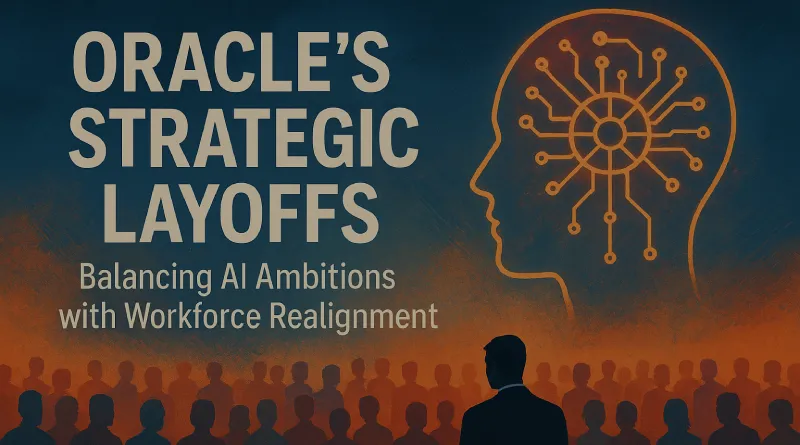Oracle’s Strategic Layoffs: Balancing AI Ambitions with Workforce Realignment
Within a fast-changing technological environment, Oracle Corporation, a leading worldwide cloud-infrastructure and enterprise software company, has already started a major wave of layoffs in its Oracle Cloud Infrastructure (OCI) units in the United States and India, and layoffs in the other parts of the world, such as Canada and Mexico, are expected. These layoffs were announced on August 13, 2025, as part of an overall decision to shift resources toward the ambitious growth underway by Oracle in AI infrastructure, and especially in the wake of a historic deal with OpenAI of $30B annually. Though the firm has not mentioned the number of workers affected exactly, accounts indicate hundreds of jobs have been scrapped, most of which take aim at India, which is huge in terms of workforce, as well as the OCI centre in Seattle. It is a controversial but logical step of a rational cost-to-productivity ratio of investment in AI projects that the tech giants followed in general.
Scope and Impact of the Layoffs
The layoffs mostly encompass the Oracle engine OCI division, which is a core technical division of its cloud business, and the affected groups and teams are Enterprise Engineering, Fusion ERP, data centre operations, and AI/ML project management, as well as OCI AI groups more broadly. In India, which is a vital centre in offering Oracle software and technical support, 10 per cent, which is an estimate of 28,824 workers out of the global figure of 162,000 workers in 2024, have been influenced. Other operational centres, such as Bengaluru, Hyderabad, and Chennai, among others, are affected by such cuts and perturb a talent pool that is vital in the global operations of the company. There have been layoffs in excess of 150 jobs in Seattle, the long-time home of OCI, where some are due to performance problems, but strategic restructuring could also be the driving force.
Workers elsewhere, such as in Canada and Mexico, have received advance notice of manager meetings that are described as being about something unspecified, sparking rumours of more international lay-offs. This is after similar layoffs in November 2024, when OCI cut a number of hundreds of positions and, in many cases, replaced senior employees with juniors at low cost. The ongoing restructuring, though, is couched as an effort to direct resources into AI-based initiatives, with Oracle also recruiting aggressively to build its AI data centres, especially in Virginia.

Strategic Context: AI Expansion and Financial Pressures
The layoffs at Oracle are part of a sweeping shift towards AI infrastructure, highlighted by its tie-up with OpenAI on the so-called Stargate project, which has the company leasing 4.5 gigawatts of data centre capacity. This deal, and agreements with TikTok and Temu, has added to the cloud revenue of the company, with OCI noting a 52 per cent revenue increase to $3 billion in Q4 FY25. But the money crunch is irresistible. It became hard to ignore negative free cash flow in the annually reported fiscal year ending May 2025 as Oracle ramped up data centres to support AI workloads, costing them tens of billions of dollars. This is also reflecting an industry-wide trend, with Microsoft also cutting 15,000 positions and Amazon and Meta likewise making cuts to finance their own AI ambitions.
It has been questioned why the layoffs were affected soon after a reported encounter between Oracle CEO and U.S. President Donald Trump on August 7, 2025. Discussions are said to have centred on the internal employment and national data safety, which might as well have caused Oracle to focus on hiring locally in terms of its AI infrastructure but with fewer international jobs cut. This goes by the policy changes in the U.S. under the Trump administration that are more focused on decreased dependency on H-1B visas and offshoring, which potentially affects India in terms of its tech workforce disproportionately.
Local Impact and Industry Implications
In India, where Oracle has been in business for 20 years, the layoffs will be especially high. The ripples to be experienced in this country include the tech sector, which is a global hub of IT services, and the fact that the skilled workforce will take up opportunities elsewhere. The reductions dent India as a talent pool that is cost-effective, and this may even compel companies to reconsider hiring materials. Meanwhile, the fact that Oracle is hiring in Virginia indicates the shift toward investing in the United States, which could be influenced by the geopolitical factor and a desire to contribute to the implementation of such high-profile AI initiatives as Stargate.
Looking Ahead
The layoffs at Oracle indicate just how much tech giants should ideally exist in the middle ground between finding new ways of doing things and keeping a lid on their expenditure. As the stock of the company has been at near records and driven by cloud momentum, restructuring in the company has resulted in the human cost in question of long-term job security in the company. In the case of the affected employees, especially in India, the scene is more towards reskilling and tapping into the emerging tech ecosystem in India. With Oracle getting more invested in AI, the capability of onboarding new employees with AI experience within the realm of its core competencies will play an important role in serving interests as it competes with the likes of AWS, Azure, and Google Cloud.
Disclaimer
The information presented in this blog is derived from publicly available sources for general use, including any cited references. While we strive to mention credible sources whenever possible, Web Techneeq – best website design company in Mumbai does not guarantee the accuracy of the information provided in any way. This article is intended solely for general informational purposes. It should be understood that it does not constitute legal advice and does not aim to serve as such. If any individual(s) make decisions based on the information in this article without verifying the facts, we explicitly reject any liability that may arise as a result. We recommend that readers seek separate guidance regarding any specific information provided here.

